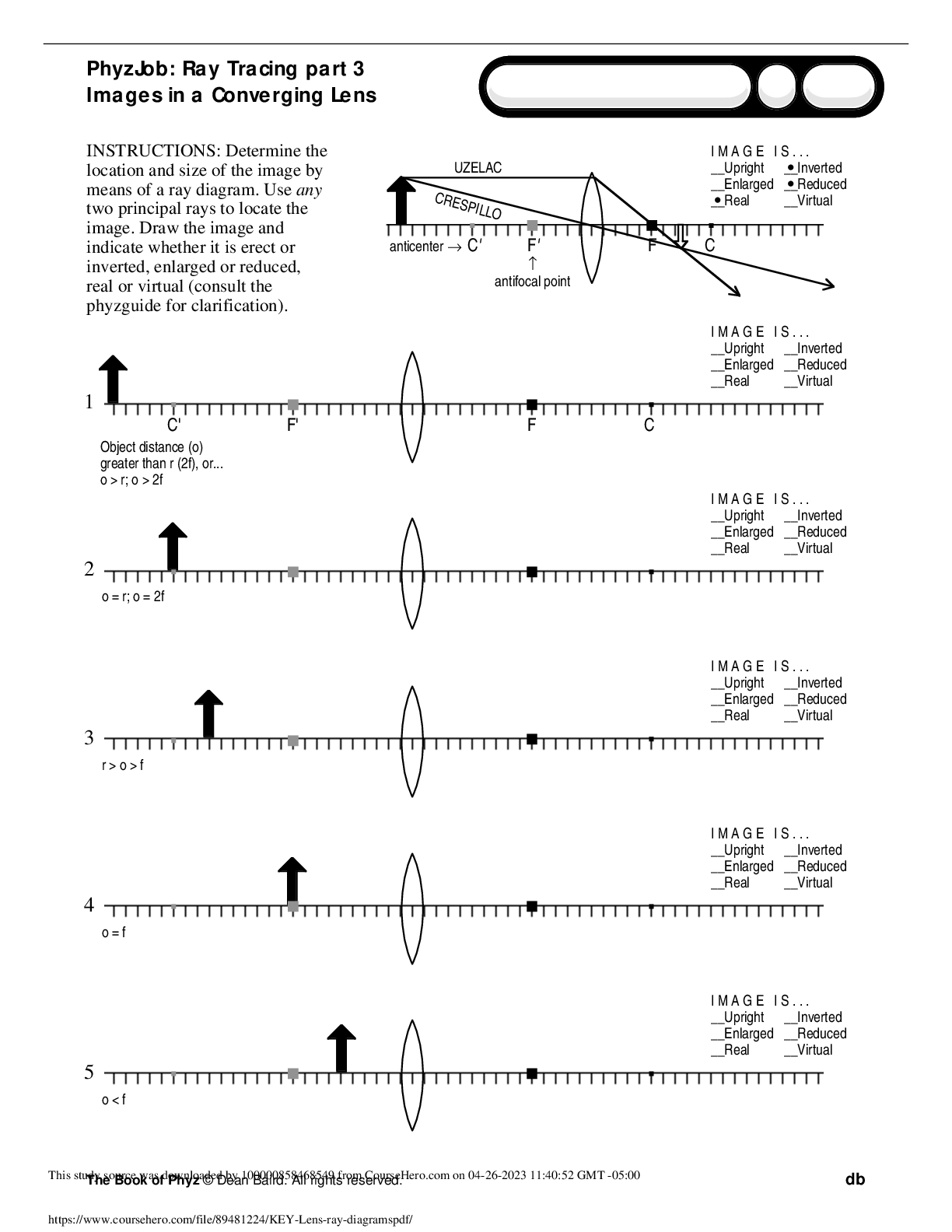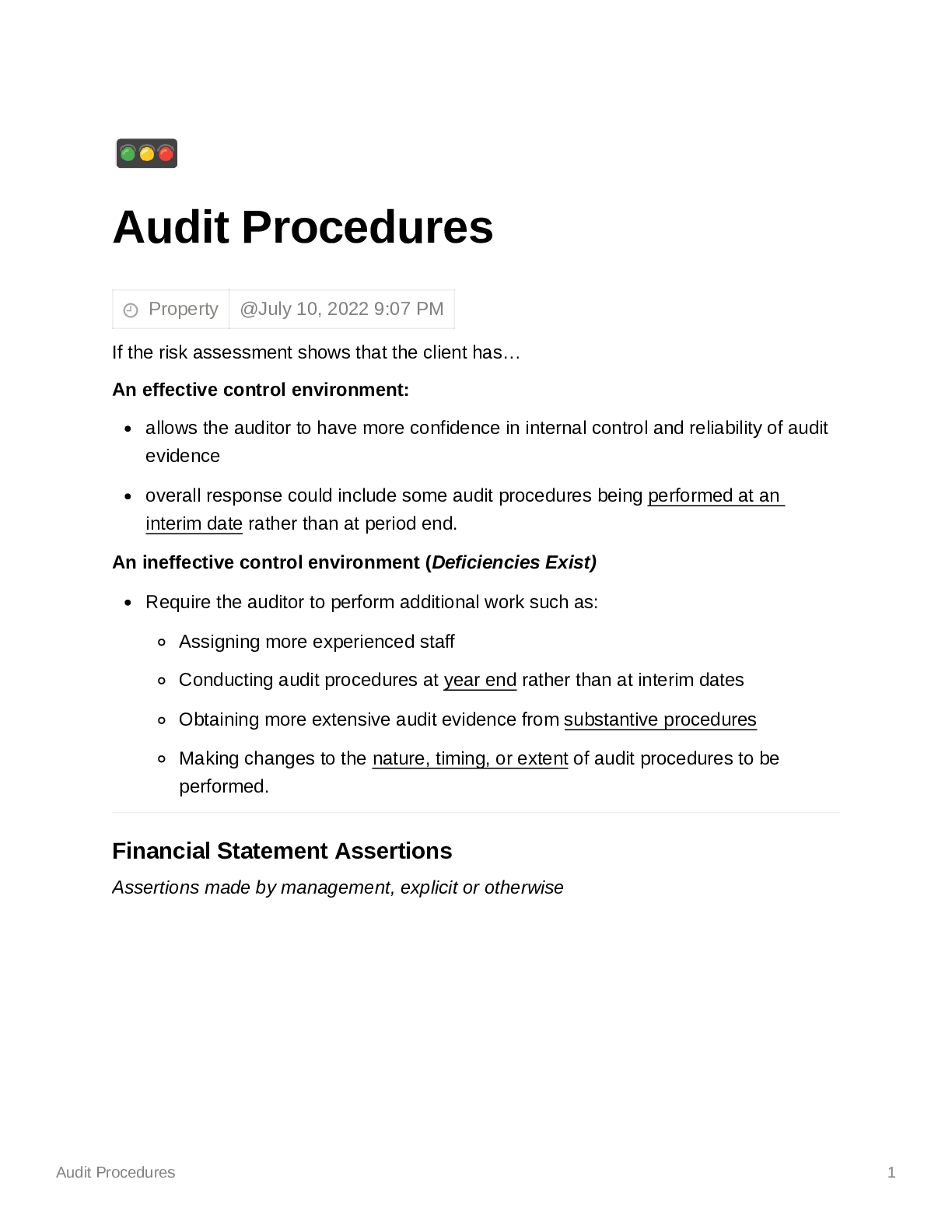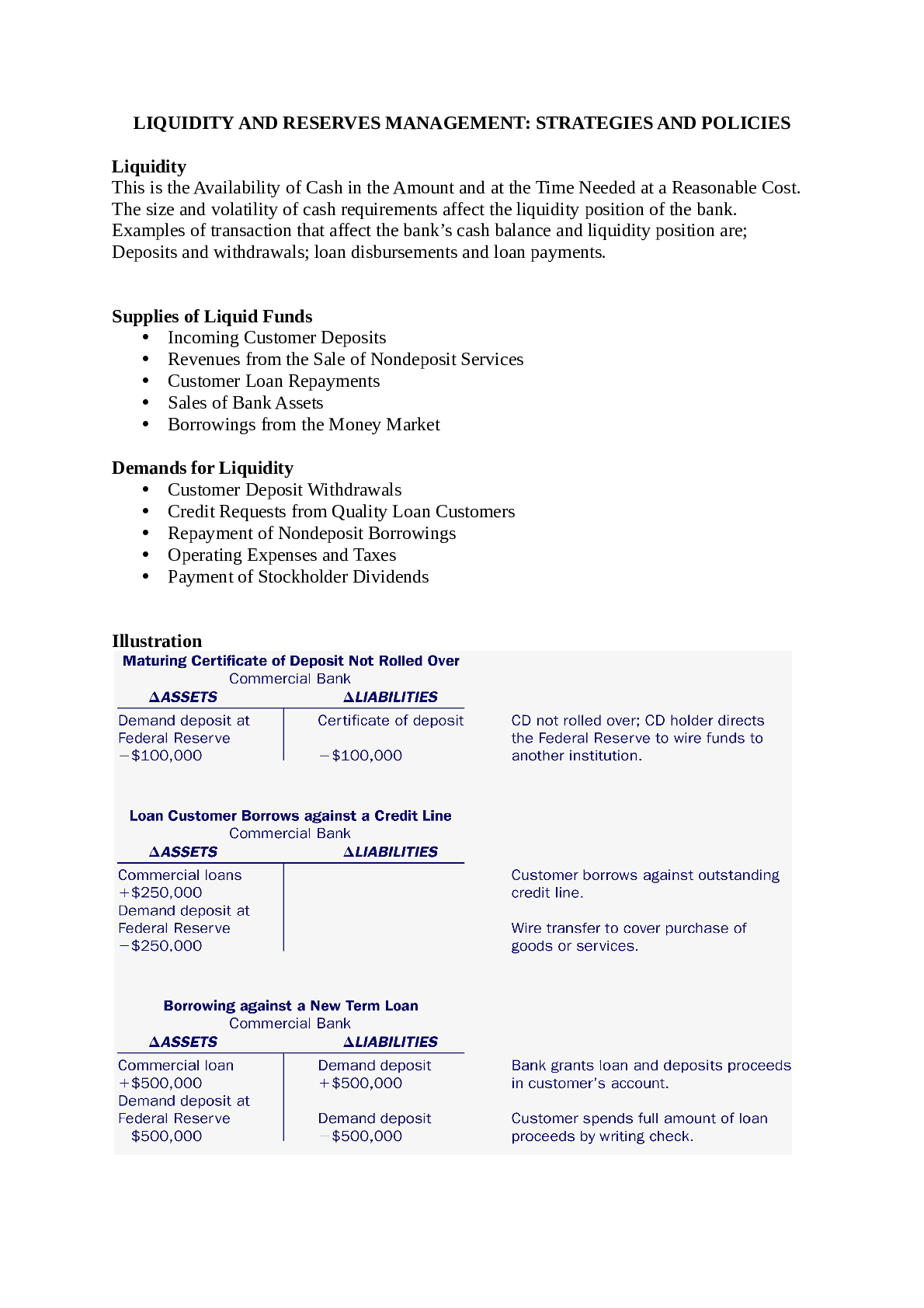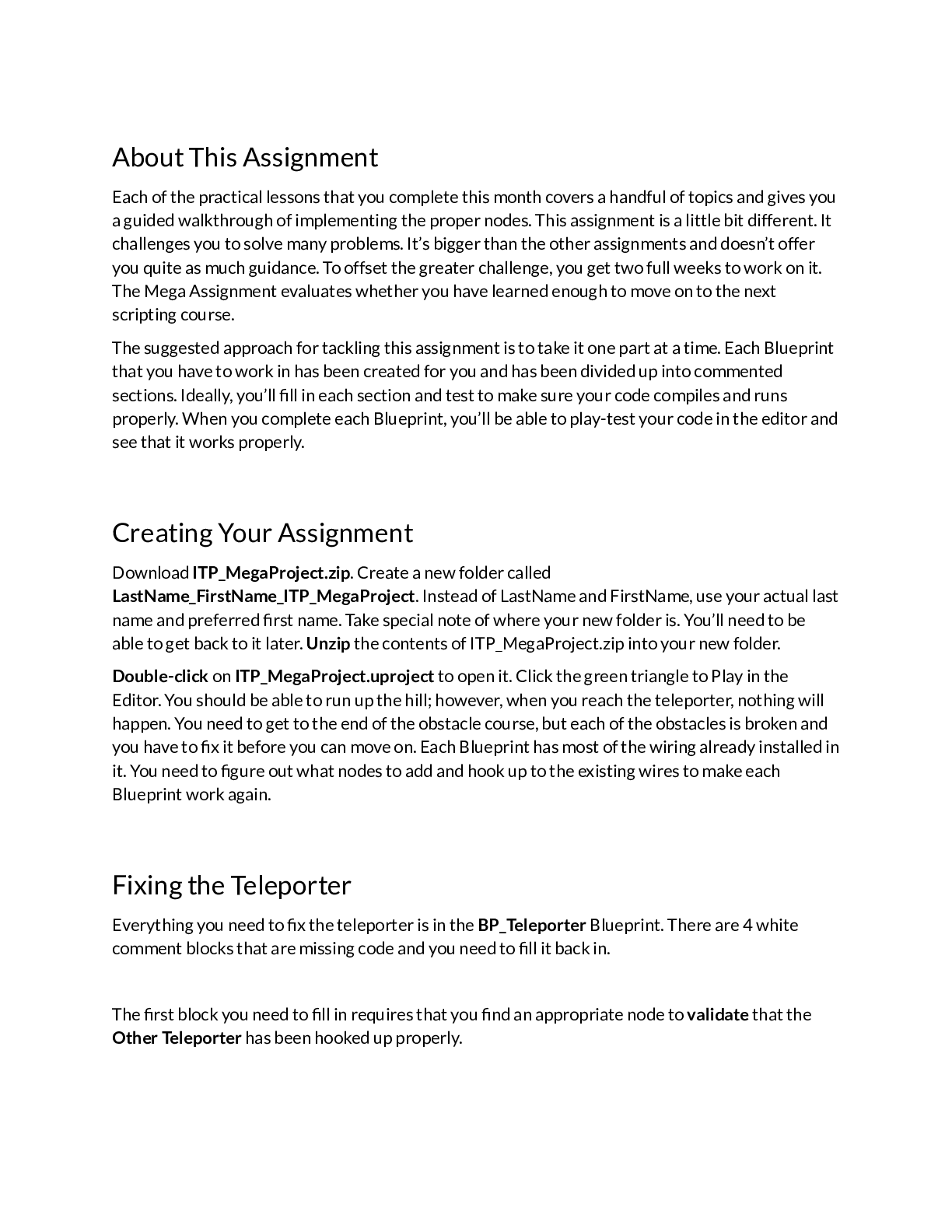*NURSING > Research Paper > Care of Clients with Maladaptive Patterns of Behavior, Acute and Chronic Psychiatric nursing (All)
Care of Clients with Maladaptive Patterns of Behavior, Acute and Chronic Psychiatric nursing
Document Content and Description Below
Care of Clients with Maladaptive Patterns of Behavior, Acute and Chronic Psychiatric nursing Mental Health A state of emotional, psychological and social wellness evidenced by satisfying int... erpersonal relationships, effective behavior and coping, positive self-concept and emotional stability. COMPONENTS OF MENTAL HEALTH Autonomy and Independence - can work interdependently without losing autonomy Maximization of One's Potential - oriented towards growth and selfactualization Tolerance of Life's Uncertainties - can face the challenges of day-to-day living with hope & positive look Self-esteem - has realistic awareness of her abilities and limitations Mastery of the Environment - can deal with and influence the environment Reality Orientation - can distinguish the real world from a dream, fact from fantasy MENTAL ILLNESS State of imbalance characterized by a disturbance in a person’s thoughts, feelings and behavior Criteria to Diagnose Mental Disorders Dissatisfactions with one's characteristics, accomplishments, abilities Ineffective or dissatisfying relationships Dissatisfaction with one's place in the world Ineffective coping with life's events Lack of personal growth PSYCHIATRIC NURSING Interpersonal process whereby the nurse through the therapeutic use of self-assist an individual family, group or community to promote mental health, to prevent mental illness and suffering, to participate in the treatment and rehabilitation of the mentally ill and if necessary, to find meaning in these experiences CORE OF PSYCHIATRIC NURSING Interpersonal relationship o Transference: unacceptable behavior, feeling, cognition or thought of a patient towards the nurse o Countertransference: unacceptable behavior, feeling, cognition or thought of the nurse towards the patient o Pre-orientation Phase: self-awareness; know patient’s information and history, know reason for admission o If you think that you cannot handle the client you can refuse, to not experience countertransference and for care to be more effective o You cannot control your emotions; you might get attached to the patient which would lead to ineffective care and countertransference o Orientation Phase: signing of contract occurs here, setting of boundaries and roles are also done here o You also inform the patient of the exact time when the contract will end o Working Phase o If during this phase you experience countertransference, best action is to inform your superior and you will be assessed o You are allowed to terminate the contract here, but if other measures are suggested you may follow it o Terminal or termination phase o Evaluation phase o If plan has of management has been met FOCUS: Patient o Do not ignore the feelings of the patient but the nurse should divert it back to the problem of the patient o It is a policy that a nurse cannot handle friends, family members, and people who have a relationship to the nurse. This may also lead to countertransference because the nurse is already attached to the clients o This will affect the care and judgment of the client Foundation Etiology of mental disorders remain unknown But there are some theories like biochemical theoriesCentral Nervous System Cerebrum Frontal lobe - control organization of thought, body movement, memories, emotions and moral behavior. o Associated with schizophrenia, attention deficit/ hyperactive disorder and dementia Parietal lobe - interpret sensations of taste and touch and assist is spatial orientation. Temporal lobes - are centers for the sense of smell, hearing, memory, and expression of emotions. Occipital lobes - assist in coordinating language generation and visual interpretation, such as depth perception. Neurotransmitters Biochemical theories say that neurotransmitters have an effect to the mental processes, behavior, cognition, and thoughts of a patient Dopamine - controls complex movements, motivation, cognition, regulates emotional responses o If low, it will cause tremors o If increased, there is a possibility to have increased cognition, to the point you are not intact with reality. A patient may become delusional: fixed problems in thoughts and cognition (Schizophrenia) o Do not contradict the delusion of your patient because it is a fixed belief and it may cause anxiety o Present reality by giving instructions to activities that will revert them back to reality o Do not argue but do not tolerate it, just keep on mind to ignore the delusion and divert the delusion to reality Serotonin - regulation of emotions, controls food intake, sleep and wakefulness, pain control, sexual behaviors o Problems in this neurotransmitter may be found in depression, anorexic, bulimic patients Acetylcholine - controls sleep and wakefulness cycle (decreased in Alzheimer's) Histamine - controls alertness, peripheral allergic reactions, cardiac stimulations GABA - modulates other neurotransmitters o Modulates norepinephrine and epinephrine o When patient is having panic anxiety there is a problem with epinephrine Norepinephrine / Epinephrine - causes changes in attention, learning and memory, mood Sympathetic Parasympathetic Increase v/s Decrease v/s Decrease GI motility Increase GI motility Decrease GU function - urinary retention Increase GU function Moist mouth Dry mouth Genetics and Hereditary Alzheimer's disease - linked with defects in chromosomes 14 and 21 Schizophrenia Mood disorders (depression) Autism and AD/HD SIGMUND FREUD Father of Psychoanalysis “Your behavior today is directly or indirectly affected by your childhood days or experiences.” o Repression a defense mechanism wherein there is unconscious forgetting STRUCTURE – Personality Structure Personality Structure ID (4-5MONTHS) Impulsive/ Instinctual drive I want to... PLEASURE PRINCIPLE I want to... PHYSIOLOGIC NEEDS I want to... PRIMARY PROCESS All about I, me, and myself SUPEREGO Should not Small voice of GOD Set norms, standards, and values MORAL PRINCIPLE Conscience Contradicts ID EGO Executive REALITY PRINCIPLE Conscious Competencies Decision Maker; Problem-Solving; Critical and Creative thinking Balances ID and superego Once this is fully developed, you are now intact to realityImbalances between Personality Elements Manic- usually seen in a bipolar patient. Patient experiences hyperactivity o Extreme exaggerated behaviors Antisocial personality disorder- personality problems in interpersonal relationships Narcissistic- there is illusion of grandiosity These are people who are strict law followers Obsessive compulsive disorder- recurring, unwanted thoughts, ideas or sensations that make them feel driven to do something repetitively o Those with ritualistic behaviors o Do not try to contradict because it will only increase their anxiety, because that is their coping mechanism o Do not abruptly stop it, but give schedules for those ritualistic behavior Obsessive compulsive personality disorder- are those who are perfectionists o They are perfectionists because they know that being unorganized is not acceptable to the society Hallucinations are sensations that seem to be real but is only created in the mind Hallucination vs illusion o Both these involve the senses, it only differs in cognition o Hallucination has no stimulus but can sense something o Illusions have stimulus but is interpreted wrongly Libido Sexual energy responsible for survival of human beings Psychosexual Theory of Freud ORAL STAGE 18 months Cry, suck, mouth EGO at 6 months Child cries - fed - successful Child cries – ignored - unimportant - narcissistic FIXATION Occurs when a person is stuck in a certain developmental stage REGRESSION Returning to an earlier developmental stage Infantile behavior ANAL STAGE 18 months 3 years old SUPEREGO develops Toilet training o Good Mother - Normal o Bad Mother Clean, organized, obedient - OC (anal retentive) Dirty, disorganized - Anti-social (anal expulsive) PHALLIC STAGE Preschooler (3 6 years old) Parent o Oedipus Complex Castration Fear o Electra Complex Penis Envy Daughter to father REPRESSION UNCONSCIOUS forgetting of an anxiety provoking concept 80% of rape victims go into repression There is a possibility that memories will go back once a person undergoes psychoanalysis or because of triggers SUPRESSION CONSCIOUS forgetting of an anxiety provoking situation IDENTIFICATION Attempts to resemble or pattern the personality of a person being admired of o Idolizing a person and copying them (behaviors, attitudes, physical appearance) INTROJECTION Acceptance of another values and opinion as one's own Thoughts and opinions of other people are taken as own Claiming of other people’s stories LATENCY STAGGE 6 to 12 years old School Reading, writing, arithmetic Ability to care about and relate to others outside home SUBLIMATION Placing sexual energies toward more productive activities o Unacceptable to acceptable behaviors to the society o Diverting sexual urges to activities that are acceptable to the society SUBSTITUTION Replace a goal that can't be achieved for another that is more realistic. o Unachievable to achievable GENITAL STAGE 12 years old and above Developing satisfying sexual and emotional relationships with members of the opposite sex Planning life's goals EGO DEFENSE MECHANISMS Function - To ward off anxiety * without defense mechanisms, anxiety might overwhelm and paralyze us and interfere with daily living 2 Features: 1.1. they operate on an unconscious level (Except suppression) 2. 2. they deny, falsify or distort reality to make it less threatening REPRESSION VS. SUPPRESSION REPRESSION Unconscious forgetting of an anxiety provoking concept SUPRESSION Conscious forgetting of an anxiety provoking situation REGRESSION VS. FIXATION REGRESSION Returning to an earlier developmental stage o Inappropriate behavior during anxiety o E.g. tantrums of an adult Infantile behavior FIXATION Occurs when a person is stuck in a certain developmental stage o A stage is not satisfied o Satisfaction of the stage is done by a person e.g. smoking o This is different from regression and mannerisms RATIONALIZATION VS. INTELLECTUALIZATION RATIONALIZATION Self-saving with incorrect illogical explanation o Reasoning out even with the wrong reasons INTELLECTUALIZATION Excessive use of abstract thinking; technical explanation o Excessive rationalization o Possibly correct but not necessary to the current situation o Focusing on situations that is not really the problem DISPLACEMENT VS. PROJECTION VS. INTROJECTION DISPLACEMENT Feelings are transferred or redirect to another person or object that is less threatening Keyword: anger or feelings Anger redirection PROJECTION Blaming; Falsely attributing to another his/her own unacceptable feelings. o This can be seen in paranoid patients o “Takot sa sarili nilang multo” o A person unconsciously transfers his/her own negative behavior to others o The person is aware that he/she possesses that behavior but subconsciously blames others for it INTROJECTION Acceptance of another's values and opinions as one’s own SUBLIMATION VS. SUBSTITUTION SUBLIMATION Transfer of sexual energy to a more productive activity.o Unacceptable behavior to acceptable behavior to the society SUBSTITUTION Replaces a goal that can't be achieved for another that is more realistic. DISSOCIATION VS. ISOLATION DISSOCIATION Separating and detaching idea, situation from its emotional significance. o Detaching from the self temporarily d/t anxiety ISOLATION Individual strips emotion when talking or responding about it. EGO DEFENSE MECHANISMS Conversion Anxiety converted to physical symptoms o E.g. stress is converted to headache Compensation Overachievement in one area to Overpower weaknesses or defective area. o There should be presence of weakness, limitation, or insecurity that will be covered up by other achievements Undoing Doing the opposite of what have done o Trying to compensate for the wrong a person has done o E.g. a guy hurt a woman and then gave her flowers after o Restitution- you do something wrong to a person but compensate by doing good to people who are involved to the person Denial Failure to acknowledge an unacceptable trait or situation Alcoholic patients commonly use this defense mechanism Fantasy Magical thinking Reaction Formation Opposite of intention Acting out Deals with emotional conflict or stressors by ACTION rather than reflection or feelings Symbolization Creates a representation to an anxiety provoking thing or concept Splitting Labile emotions; all bad - all good DEFENSE MECHANISMS COMMONLY USED IN EACH RESPECTIVE DISORDERS Paranoid - Projection Phobia - Displacement Amnesia - Dissociation Anorexia - Suppression Bipolar Disorder - Reaction Formation Borderline - Splitting Schizophrenia - Regression Substance Abuse-Denial Depression - Introjection OC - Undoing Catatonic - Repression Woman who is angry with her boss writes a short story about a heroic woman. Four-year old with new baby brother starts sucking his thumb and wanting a bottle. Patient criticizes the nurse after her family failed to visit Man who is unconsciously attracted to other women teases his wife about flirting Short man becomes assertively verbal and excels in business. Recovering alcoholic constantly preaches about the evils of drink. Man reacts to news of the death of a loved one “No, I don't believe you. The doctor said he was fine.” Student is unable to take a final exam because of a terrible headache. After flirting with her male secretary, a woman brings her husband tickets to a show. “I didn't get the raise because my boss doesn't like me." Five-year old girl dresses in her mother's shoes and dress and meets daddy at the door. After his wife's death, husband has transient complaints of chest pain and difficulty breathing- the symptoms his wife had before she died [Show More]
Last updated: 1 year ago
Preview 1 out of 37 pages
Instant download

Buy this document to get the full access instantly
Instant Download Access after purchase
Add to cartInstant download
Reviews( 0 )
Document information
Connected school, study & course
About the document
Uploaded On
Jan 09, 2023
Number of pages
37
Written in
Additional information
This document has been written for:
Uploaded
Jan 09, 2023
Downloads
0
Views
87

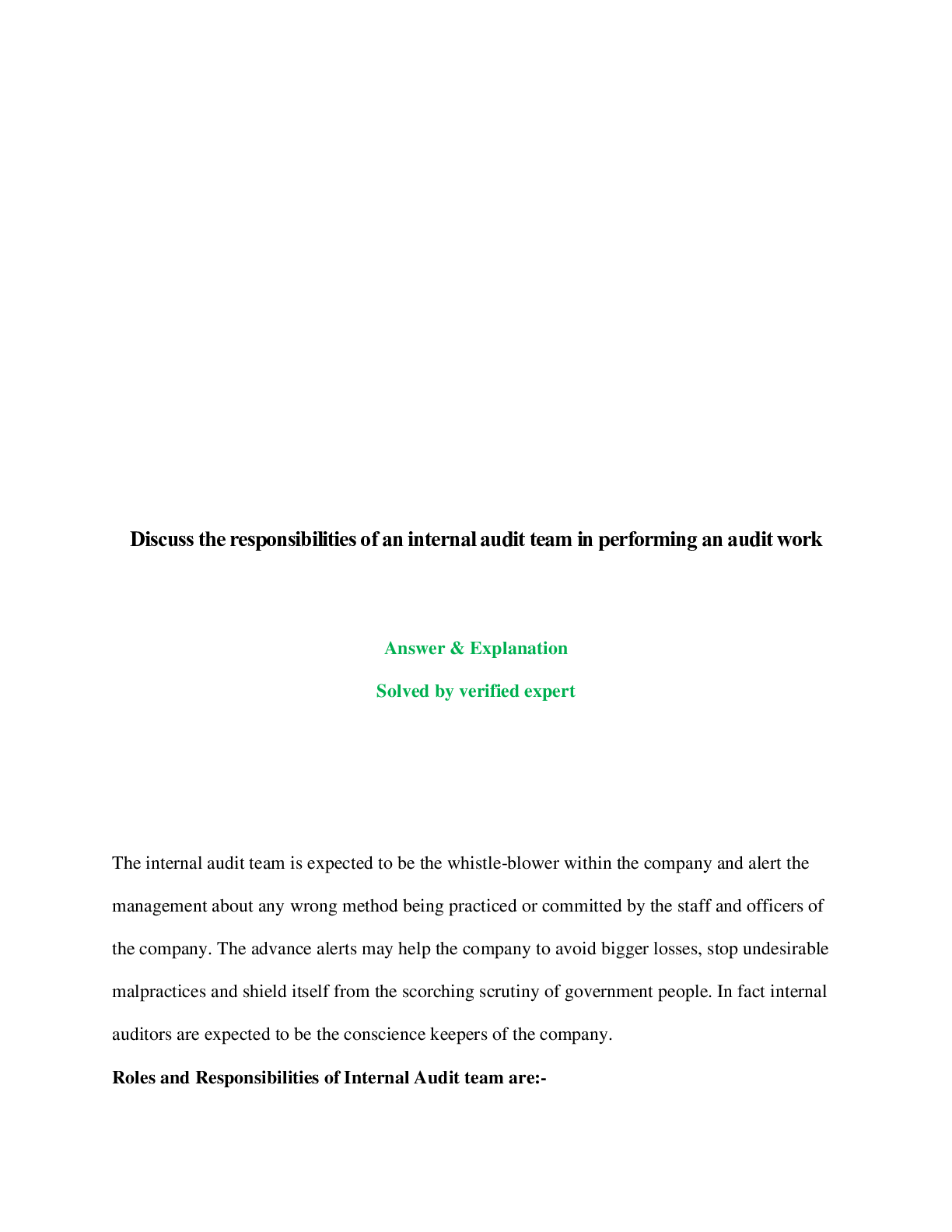
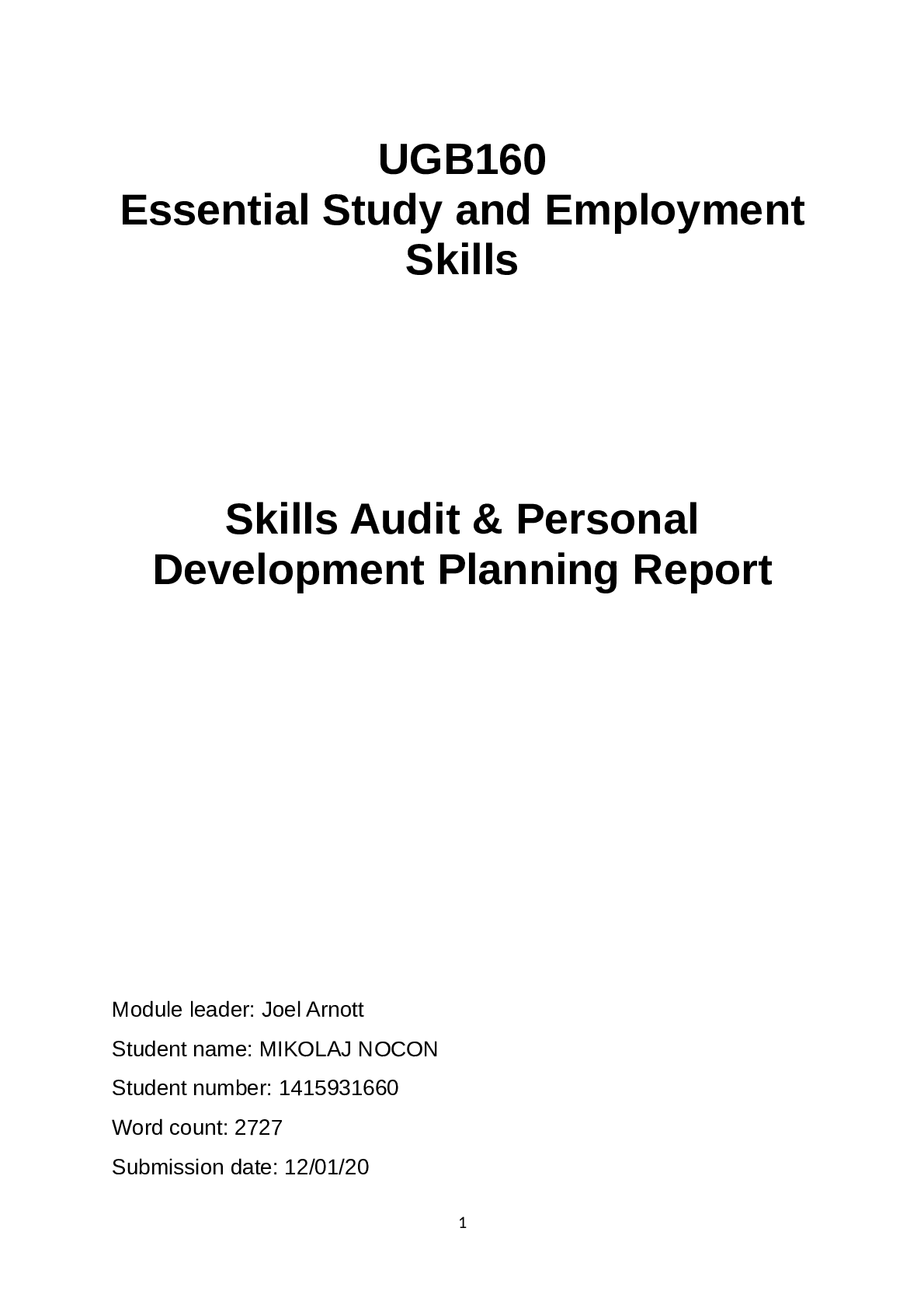
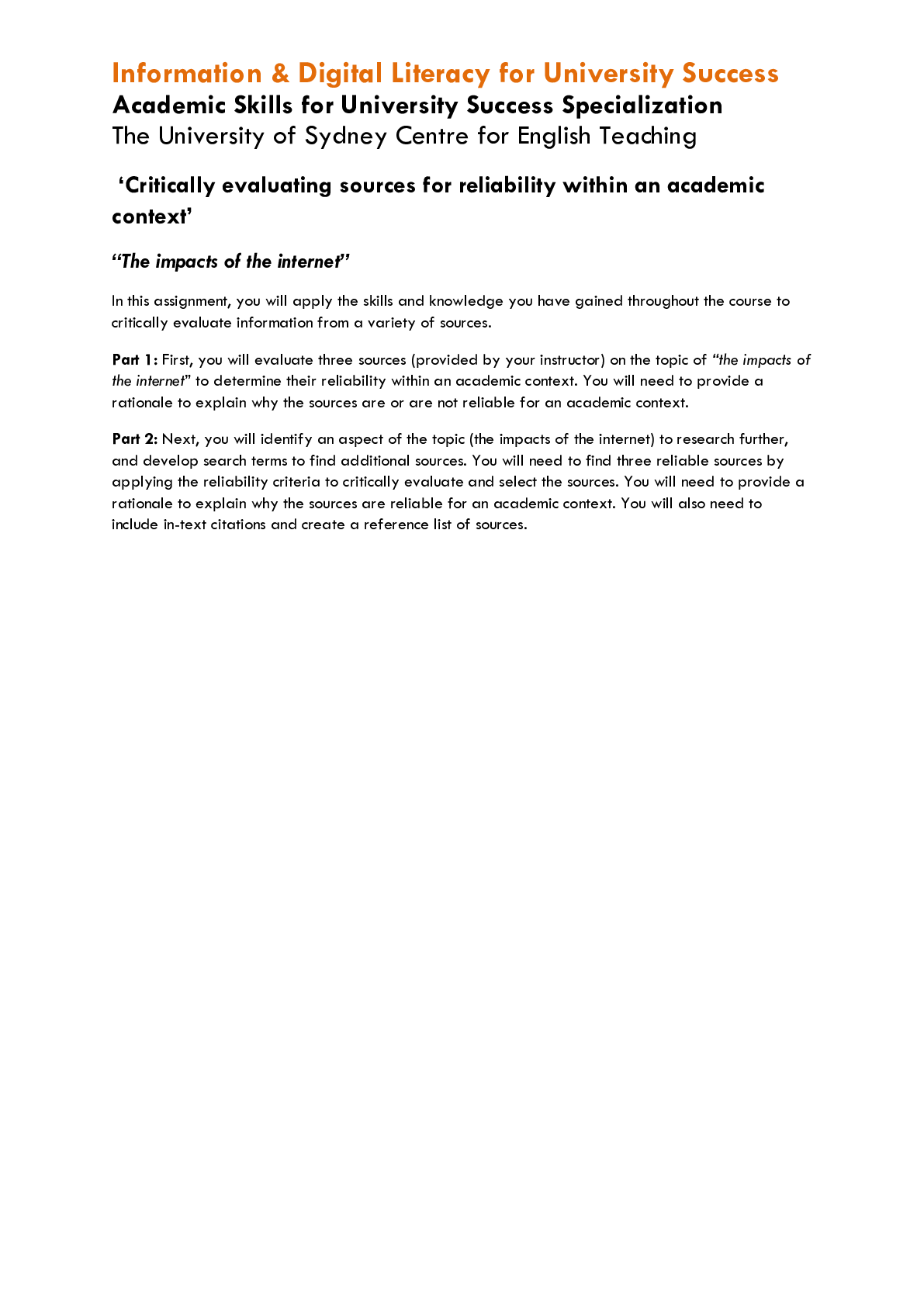
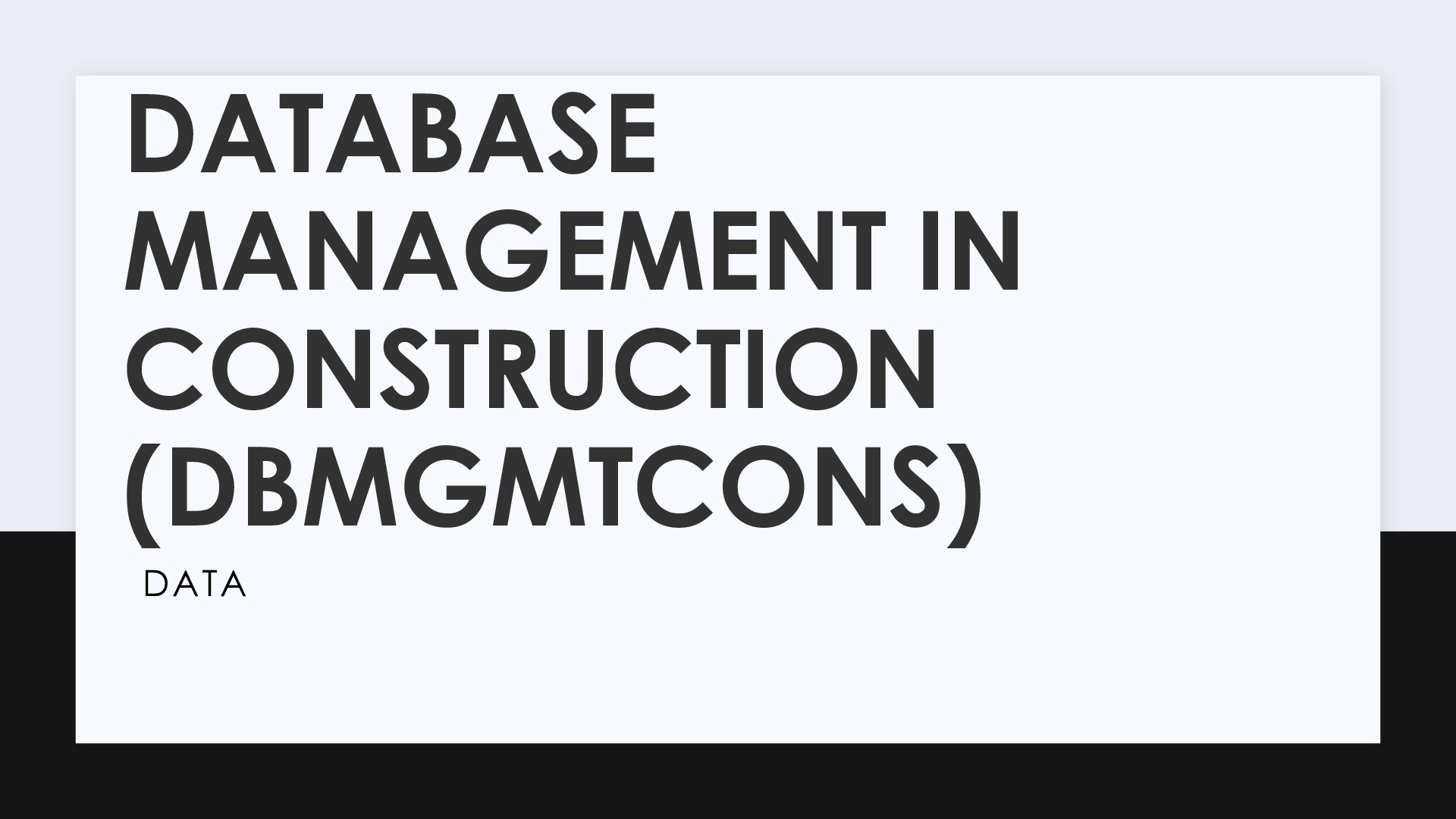
dfdfefe.png)

